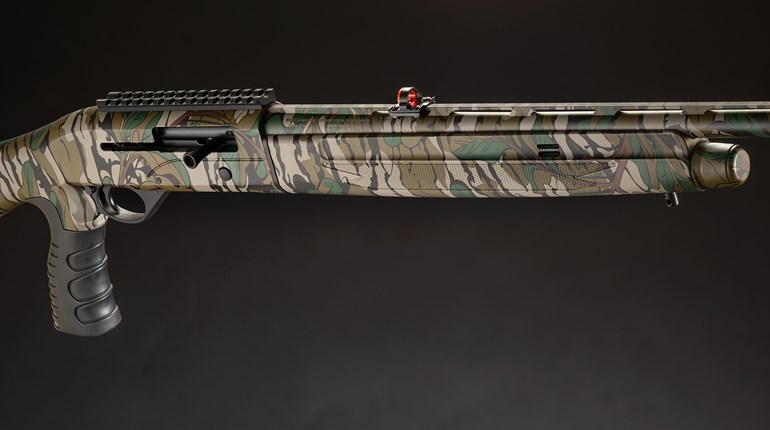Can a 28-inch-long, 15-round shotgun be used for sporting purposes? Of course it can; after all, the Henry lever-action—America’s original “assault rifle”—is now exclusively a sporting arm. But is it ideal in the field? I’ll admit I struggled to keep a straight face when my old fishing buddy, Ted Hatfield, called me up to tell me about his latest creation, the UTS-15.
“The mere sight of it will make women and small children scream!” he quipped. “And now that it’s in camo, it’s the perfect tactical turkey gun!”
I’d have to test that for myself, but before I get into the gun, first let me tell you about the man. Theodore Hatfield was born in St. Joseph, Mo., with an innate distrust of anyone named McCoy. His father owned a gun shop, and young Teddy liked to tinker. You may have heard of the muzzleloader company Austin and Halleck. The latter half of that label is Ted’s middle name. Later his gunmaking interests turned to side-by-side shotguns, of which he produced high-end models for his own company, Hatfield Gun Co., and for others such as Kimber. As a writer and editor he did stints at Sports Afield and this magazine’s sister publication, American Rifleman, before leaving NRA to become Benelli USA’s PR man.
But all the while Hatfield was thinking about how he could make money selling guns. He knew the market wasn’t begging for bird guns, and it definitely wasn’t on fire for muzzleloaders. He realized the tactical market was the ticket, but it was already saturated with AR-15s. So he devised a high-capacity shotgun and dressed it up like Dracula to woo the weekend warrior in us all.
Using his established connections in Turkey, Hatfield took his original action and stock design, dropped in an AR-15 trigger group, and began the manufacturing process with parts made in both Turkey and the U.S. The gun, named the UTS-15 for its 15-round capacity, is assembled here by his jointly owned company, UTAS USA.
The pump-action shotgun has two parallel magazine tubes atop a single barrel. Each tube holds seven rounds and feeds the chamber alternately or exclusively, depending on the position of the magazine lever. If the lever is thrown left, it blocks the left magazine and allows only the right to feed, and vice-versa. With the lever set in the middle, the tubes alternate feeding until both are empty. In this way a shooter can load one tube with buckshot and the other with slugs, for example, and shoot them in any order. Both magazines have viewing windows that reveal how many shells remain.
Another part of the shotgun’s genius is its bullpup design that places the action in the buttstock. With an 18.5-inch barrel, the UTS-15 measures a cutlass-like 28.3 inches overall. Reasonably short barrels on shotguns don’t hamper ballistic performance, as a shotshell develops nearly all of its velocity within the first 20 inches of barrel. So with an 18.5-inch barrel, only a negligible amount of velocity and energy is lost—certainly not enough for a turkey to notice inside 60 yards.
The UTS-15’s chassis is made of reinforced polymer. It wasn’t perfect when the gun was first released a couple years ago. Polymer’s flexibility can be a good thing for some gun parts, but the receiver was too flexible. As a result, the rear-hinged action cover/cheekpiece that allows easy shell clearing and cleaning had a bad habit of popping open when the gun was fired. It wasn’t dangerous, but it was faulty. So Hatfield reinforced the receiver polymer with carbon fiber, and now the UTS-15 runs smoothly if you do your part and don’t short-stroke it. (See Executive Editor Adam Heggenstaller shoot it super fast on my BullShooters blog.)
To load the UTS-15, flip down one of the hinged loading gates, push the follower into the magazine tube, and then stoke it with up to seven, 23/4-inch shells. Repeat on the other side. Push the action-release button, located on the heel of the buttstock, and pump to chamber a round. When it comes time to pull the trigger, rotate the two-position thumb safety to fire.
I installed a full choke tube, mounted an EOTech sight, shoved nearly a box of Federal Premium No. 7 Heavyweight shells into the gun, and patterned it at 25 and 50 yards. The patterns were on par with any good turkey gun. That told me hunting turkeys with the UTS-15 was not just some kind of stunt, and I actually enjoyed carrying this tactical turkey gun in the woods! With it slung flat on my back, barrel down, I walked, called and hunted freely without the barrel or buttstock snagging low-hanging branches.
For home defense, the UTS-15 will make an intruder wish he wouldn’t have. An optional flashlight and laser mounts neatly in the fore-end cap, both of which can be worked with a finger-controlled toggle. Obviously, this little shotty is good for personal protection, but I digress.
On the plains of western Oklahoma I called in a gobbler, but he was reluctant to come closer than 50 yards. So I placed the EOTech’s reticle on the bird’s beak and pulled the trigger. Chambering another round wasn’t necessary, but I pumped anyway. A year later and several more turkeys down with the UTS-15, I still haven’t reloaded it with fresh shells—and I think I can go another year.
There are a few negatives. The gun takes a while to load. Secondly, when the action-port cover is left open, it swings down and jingles against the stock. Finally, while the optional laser looks cool, its adjustments for zeroing do not work as well as they should.
Ultimately, the UTS-15 can be used for big-game or self-defense. Loaded with only several shells to cut down weight, it’s ideal for turkeys. (Check local hunting regs on the number of rounds permitted in a turkey gun.) During the Civil War it was a Confederate officer speaking about the then-feared Henry who said it was a rifle “you could load on Sunday and shoot all week long.” Well, the UTS-15 is a shotgun you can load in March and hunt turkeys all year long.
UTAS USA UTS-15
Type: pump-action repeating shotgun
Gauge/Chamber: 1 2/3"
Capacity: 14+1 (2 3/4" shells), 12+1 (3" shells)
Barrel: 18.5"; threaded for Beretta-style choke tubes
Trigger: single-stage; 8.25-lbs. pull weight
Sights: none; Picatinny rail for mounting optional iron sights and optics
Safety: 2-position, AR-style lever
Stock: carbon-fiber-reinforced polymer w/camo finish (tested); LOP 12 1/8"; drop at heel 1 5/8"; drop at comb 1 5/8" (with UTAS iron sights)
Metal Finish: camo and matte black
Overall Length: 28.3"
Weight: 6 lbs, 14 oz.
Accessories: cylinder choke tube
MSRP: $1,450 (camo, desert tan), $1,250 (black), $1,650 (marine)


































